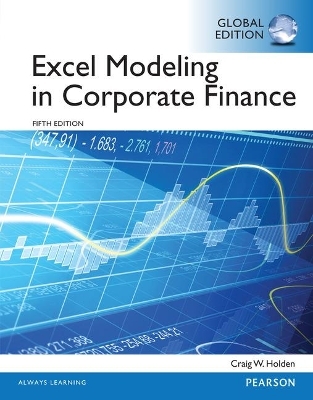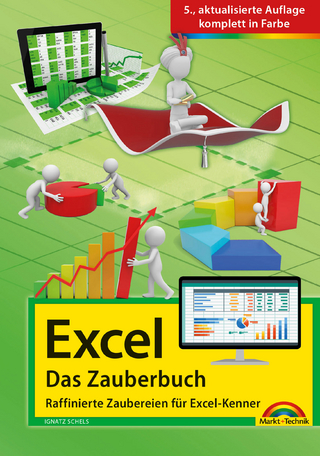
Excel Modeling in Corporate Finance, Global Edition
Pearson Education Limited (Verlag)
978-1-292-05938-9 (ISBN)
Excel Modeling in Corporate Finance approaches building and estimating models with Microsoft® Excel®. Students are shown the steps involved in building models, rather than already-completed spreadsheets.
For courses in corporate finance or financial management at the undergraduate and graduate level. Excel Modeling in Corporate Finance approaches building and estimating models with Microsoft(R) Excel(R). Students are shown the steps involved in building models, rather than already-completed spreadsheets.
Preface
Fifth Edition Changes
Ready-To-Build Spreadsheets
What Is Unique About This Book
Conventions Used In This Book
Craig's Challenge
Excel® Modeling Books
Suggestions for Faculty Members
Acknowledgements
About The Author
PART 1 TIME VALUE OF MONEY
Chapter 1 Single Cash Flow
1.1 Present Value
1.2 Future Value
Problems
Chapter 2 Annuity
2.1 Present Value
2.2 Future Value
2.3 System of Four Annuity Variables
Problems
Chapter 3 NPV Using Constant Discounting
3.1 Nominal Rate
3.2 Real Rate
Problems
Chapter 4 NPV Using General Discounting
4.1 Nominal Rate
4.2 Real Rate
Problems
Chapter 5 Loan Amortization
5.1 Basics
5.2 Sensitivity Analysis
Problems
Chapter 6 Lease Vs. Buy
6.1 Car
6.2 Corporate
Problems
PART 2 VALUATION
Chapter 7 Bond Valuation
7.1 Annual Payments
7.2 EAR, APR, and Foreign Currencies
7.3 Duration and Convexity
7.4 Price Sensitivity
7.5 System of Five Bond Variables
Problems
Chapter 8 Estimating the Cost of Capital
8.1 Static CAPM Using Fama-MacBeth Method
8.2 APT or Intertemporal CAPM Using Fama-McBeth Method
Problems
Chapter 9 Stock Valuation
9.1 Dividend Discount Model
Problems
Chapter 10 Firm and Project Valuation
10.1 Cash Flows for Five Equivalent Methods
10.2 Adjusted Present Value
10.3 Free Cash Flow To Equity
10.4 Free Cash Flow to the Firm
10.5 Dividend Discount Model
10.6 Residual Income
10.7 Five Equivalent Methods
Problems
Appendix: Reconciling the Residual Income Method with Other Approaches to Valuing Firms or Projects
Chapter 11 The Yield Curve
11.1 Obtaining It From Treasury Bills and Strips
11.2 Using It To Price A Coupon Bond
11.3 Using It To Determine Forward Rates
Problems
Chapter 12 US Yield Curve Dynamics
12.1 Dynamic Chart
Problems
PART 3 CAPITAL STRUCTURE
Chapter 13 Capital Structure
13.1 Modigliani-Miller With No Taxes.
13.2 Modigliani-Miller With Corporate Taxes
13.3 Trade-off Model: Tax Shield vs. Distress Cost
Problems
PART 4 CAPITAL BUDGETING
Chapter 14 Project NPV
14.1 Basics
14.2 Forecasting Cash Flows
14.3 Working Capital
14.4 Sensitivity Analysis
Problems
Chapter 15 Cost-Reducing Project
15.1 Basics
15.2 Sensitivity Analysis
Problems
Chapter 16 Break-Even Analysis
16.1 Based On Accounting Profit
16.2 Based On NPV
Problems
PART 5 FINANCIAL PLANNING
Chapter 17 Corporate Financial Planning
17.1 Actual
17.2 Forecast
17.3 Cash Flow
17.4 Ratios
17.5 Sensitivity
17.6 Full-Scale Estimation
Problems
Chapter 18 Du Pont System Of Ratio Analysis
18.1 Basics
Problems
Chapter 19 Life-Cycle Financial Planning
19.1 Taxable Vs. Traditional Vs. Roth Savings
19.2 Basic Life-Cycle Planning
19.3 Full-Scale Life-Cycle Planning
Problems
PART 6 INTERNATIONAL CORPORATE FINANCE
Chapter 20 International Parity
20.1 System of Four Parity Conditions
20.2 Estimating Future Exchange Rates
Problems
PART 7 OPTIONS AND CORPORATE FINANCE
Chapter 21 Binomial Option Pricing
21.1 Estimating Volatility
21.2 Single Period
21.3 Multi-Period
21.4 Risk Neutral
21.5 Average of N and N-1
21.6 Convergence to Normal
21.7 American With Discrete Dividends
21.8 Full-Scale
Problems
Chapter 22 Real Options
22.1 Option To Abandon
22.2 Option to Expand
22.3 Option to Contract
22.4 Option To Choose
22.5 Compound Option
Problems
Chapter 23 Black-Scholes Option Pricing
23.1 Basics
23.2 Continuous Dividend
23.3 Implied Volatility
Problems
Chapter 24 Debt And Equity Valuation
24.1 Two Me
| Verlagsort | Harlow |
|---|---|
| Sprache | englisch |
| Maße | 216 x 277 mm |
| Gewicht | 512 g |
| Themenwelt | Schulbuch / Wörterbuch |
| Informatik ► Office Programme ► Excel | |
| Wirtschaft ► Betriebswirtschaft / Management ► Finanzierung | |
| ISBN-10 | 1-292-05938-9 / 1292059389 |
| ISBN-13 | 978-1-292-05938-9 / 9781292059389 |
| Zustand | Neuware |
| Informationen gemäß Produktsicherheitsverordnung (GPSR) | |
| Haben Sie eine Frage zum Produkt? |
aus dem Bereich


